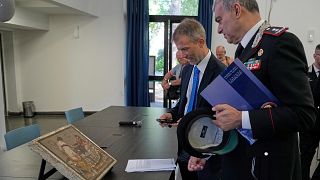Interview
Conversations around sexuality are seen as taboo in most parts of Africa. The lives of some sexual minorities have long been filled with rejection and pain. And even for some suicide. Imagine your friend, a loved one or a relative who identifies as queer, having to deal with this on a daily basis.
Queer is the broad term for members of the Lesbian, Gay, Bisexual, Transgender, Queer, Intersex + more or simply LGBTQI+ community. On the interview today, our focus is to put these issues into perspective. Over the years, the dominant narratives around sexual minorities have been negative and dehumanizing. Uganda has denied seeking to re-introduce the death penalty for gay sex. The debate continues.
In August this year, Kenya became the first African nation to count ‘Intersex’ people in its national census. A big win for activists. Despite this, most nations on the continent have inhumane sanctions for consensual relationships between queer people. I invite you on a journey with an open mind and heart for what I call a must-have conversation.
I was selected among 25 journalists from Sub-Saharan Africa to undertake a 5-day training workshop on covering LGBTQI+ and religion issues in Cape Town, South Africa. The training was organized by Taboom Media which is working to break the power surrounding issues considered taboo in society.
From that stage, my intention is to take you to a place where human dignity is respected and upheld. My quests will help us understand what African sexualities are and the big questions: Can you be queer and still have a belief in a higher power or God? And how challenging is reporting on LGBTQI+ and religion issues in Africa? We’ll hear from journalists working in Sub-Saharan Africa.
My guests are Zimbabwean feminist and globally recognized human rights advocate, Isabella Matambanadzo. Carl Collison is a Cape Town -based freelance journalist who’s done extensive work on sexual minorities in Africa. Professor Kola Adebayo is with the Federal University of Agriculture Abeokuta in Nigeria.
In our conversation, Matambanadzo said that ‘‘We are not just talking about subjects, we are talking about human beings who deserve absolute dignity and humanity. And we have a context where black, lesbian, gay, transgender, ‘‘intersex’‘ and queer people are committing suicide. Because of the kind of social pressures that the professor has referred to. And we need to ask ourselves this question really, how do we reject this kind of oppression on human beings.’‘
For Collison ‘‘any initiative that offers a welcome to marginalized groups is important at this time. Whether it is queer people or refugees’‘, when asked if there are religious groups across all faith-based organizations that support queer communities. He said ‘‘there are numerous groups. Like in South Africa alone, we have the Al-Fitrah organization, which is a Muslim-faith based organization, Inclusive and affirming ministries. I have also interviewed people from countries like Uganda and Nigeria who work on supporting and including queer people within the faith sector.’‘
Professor Adebayo holds a neutral position. ‘‘Yes, I think as continent we tend not to discuss queerness. Infact sexuality generally.’‘ He was responding to assertions why critics that Africa is not ready to accommodate queer people because of supposed values within the continent.’‘ He added that ‘‘when you then bring in Christianity and Islam, it changes the dialogue. And I think that change in dialogue has influenced the way Africans are represented when issues of queerness is being discussed. But I think that as a people we need more information about the diversity in our society and that being queer is not the same thing as being evil or bad, which is the wrong information out there.’‘












02:03
Muhammadu Buhari's legacy: higlight of his presidential tenure
01:01
Kenya: Visa-free travel now available for many African and Caribbean countries
Go to video
Paraguayan town celebrates vibrant Kamba Ra'anga festival with masks, fire and tradition
01:47
Chinese city of Xuchang is world's biggest producer of wigs
01:15
U.S. considers adding more African countries to travel ban
01:37
Kenyan police officer arrested after protests over blogger's death in custody